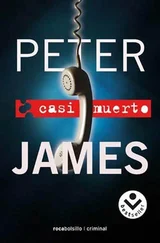Peter James - Perfect People
Здесь есть возможность читать онлайн «Peter James - Perfect People» весь текст электронной книги совершенно бесплатно (целиком полную версию без сокращений). В некоторых случаях можно слушать аудио, скачать через торрент в формате fb2 и присутствует краткое содержание. Жанр: Триллер, на английском языке. Описание произведения, (предисловие) а так же отзывы посетителей доступны на портале библиотеки ЛибКат.
- Название:Perfect People
- Автор:
- Жанр:
- Год:неизвестен
- ISBN:нет данных
- Рейтинг книги:4 / 5. Голосов: 1
-
Избранное:Добавить в избранное
- Отзывы:
-
Ваша оценка:
- 80
- 1
- 2
- 3
- 4
- 5
Perfect People: краткое содержание, описание и аннотация
Предлагаем к чтению аннотацию, описание, краткое содержание или предисловие (зависит от того, что написал сам автор книги «Perfect People»). Если вы не нашли необходимую информацию о книге — напишите в комментариях, мы постараемся отыскать её.
Perfect People — читать онлайн бесплатно полную книгу (весь текст) целиком
Ниже представлен текст книги, разбитый по страницам. Система сохранения места последней прочитанной страницы, позволяет с удобством читать онлайн бесплатно книгу «Perfect People», без необходимости каждый раз заново искать на чём Вы остановились. Поставьте закладку, и сможете в любой момент перейти на страницу, на которой закончили чтение.
Интервал:
Закладка:
She set the machine down again. ‘OK, my first question, Dr Klaesson, is what were the influences that made you decide to become a research scientist?’
‘I thought you wanted to talk about my department and the work we’re doing, rather than individuals?’
‘I’d just like a little background.’
‘Sure.’
Giving him an encouraging smile, she said, ‘Are either of your parents scientists?’
‘No, we don’t have any other scientists in our family. My father was a salesman.’
‘Did he have any interest in science?’
John shook his head. ‘Not remotely. Fishing and gambling were his things – he was a walking encyclopedia of rods, lines, weights, lures, floats, bait, poker odds and race-horse form. He could tell you where the fish hung out at what time of day in every stretch of water within thirty miles of our home, and what horse was running in any race just about anywhere in the world.’ He smiled. ‘I guess he was into the science of fishing and betting.’
‘Do you think there’s some analogy between fishing and the methodology of scientific research?’ she asked.
John was torn between trying to keep the reporter happy and trying to steer her on to what he really wanted to talk about. ‘I think my mother was a much bigger influence,’ he said. ‘She used to be a mathematics teacher – and she’s always taken a great interest in everything. And she’s a hugely practical woman. She could take an electric motor to pieces to show me how it worked one day, and another day sit me down and discuss the religious writings of Emanuel Swedenborg. I think she gave me my curiosity.’
‘Sounds like you have more of her genes than your father’s.’
The remark brought his thoughts abruptly back to Dettore. ‘Perhaps,’ he said, distractedly.
How the hell could Dettore have got it wrong? How? How?
‘OK, Dr Klaesson, I wonder now if you could describe in – like – a couple of sentences, the broad beats of your research team’s work?’
‘Sure, absolutely.’ He thought for some moments. ‘How much do you know about the construction of the human brain?’
Her expression hardened, just a fraction, just enough for him to receive the message loud and clear. Don’t patronize me.
‘I did my PhD on “The Nature Of Consciousness”,’ she said.
That whacked him. ‘You did? Where?’
‘At Tulane.’
‘I’m impressed.’ He was surprised, too. He had not been expecting her to have anything beyond a working knowledge of science.
‘I just didn’t want you thinking you were talking to a no-brainer.’
‘Not for one moment did I-’
She leaned back with a big smile, her face all warmth again. ‘You did! I could see it!’
He raised his hands in surrender. ‘Hey, give me a break! I’ve had a hard day – I don’t need you beating up on me at the end of it!’
His beer arrived. He took it from the waitress’s hand before she’d had a chance to set it down and drank a deep gulp. ‘Right. Your question. We’re examining human organs, and in particular the human brain, trying to understand better their pathways of evolution to our present state, and how much further evolution will change them in the future.’
’And you are hoping one of the results will be to lead you to understand what human consciousness is?’
‘Exactly.’
‘Is Neural Darwinism a way to describe your simulation programs?’
‘That’s Edelman’s phrase.’ He drank some more beer. ‘No, there’s quite a difference.’ A smear on the right lens of his glasses was irritating him. He took them off and wiped them with his handkerchief. ‘You must have covered this field at Tulane. Neural Darwinism relates to when you build a robot that doesn’t actually have a program – it has to learn from its experiences, the way human beings do. That’s taking steps towards building thinking machines by copying some of the ways human brains work. We’re not doing that – our field is different.’
He held his glasses up to the light and still wasn’t satisfied. Wiping them some more, he said, ‘Our methodology is to simulate millions of years of evolution in our computers, making virtual replicas of primitive brains and seeing if, by replicating natural selection, we can arrive at far more complex models that are closer to our own brains. At the same time we make virtual models of current human brains and let them keep evolving way into the future.’
‘I’m puzzled by something there, Dr Klaesson.’
‘Call me John.’
‘John, OK, thanks. You say you make virtual replicas of primitive brains?’
‘That’s correct.’
‘How primitive, John? How far are you going back? Palaeolithic? Jurassic? Cambrian?’
‘Before then, even. Right back to Archaean.’
The third beer was kicking in now. He noticed to his surprise he had drunk nearly two thirds of it. He knew he had to slow down, but it was really making him feel good.
‘And when you do finally understand how the human brain was formed, then you’ll understand consciousness?’
‘Not necessarily – you’re making a big leap there.’
‘Oh, right.’ She was grinning and her voice was cynical. ‘You’re going to switch off your computer one day and say, Hey, I just finally figured out how the human brain was formed. Now I’m going to go home and feed the cat. Is that it?’
John smiled back.
‘From the way you work, for you to have figured out how the brain was formed, you’d have a virtual model of it in your computer. Then the next step is going to be improving it, right? What will you do – add on more memory? Some kind of interface with humans?’
‘Whoa! You’re going too fast.’
‘I’m not, Dr Kl- John, I’m just quoting from a paper you published three years ago.’
He nodded, remembering now. ‘Ah yes, OK.’ He smiled. ‘You’ve done your homework – but that wasn’t the theme of the paper – I was hypothesizing.’ He was getting concerned suddenly that this interview was heading the wrong way. He needed to get a grip and steer it. ‘Listen, this speculation about the future – I’m happy to talk about it, but could we keep that whole area off the record?’
‘Hi, how you folks doing? Get you some more drinks?’ The waitress had suddenly materialized and was standing beside him.
John saw that the reporter’s glass was almost empty. ‘Sure,’ he said. ‘Sally – another one?’
She hesitated a moment. ‘How’s your time? I’m not keeping you too long?’
He glanced at his watch. Half seven. Naomi wouldn’t be home until after nine, she’d told him. ‘I’m fine,’ he said.
‘OK, I’ll have another Chardonnay.’
John considered his empty glass for a moment. As a student in Sweden he could easily manage upwards of half a dozen of these – and stronger beer too. ‘Same again – I’ll live dangerously!’
Sally reached forward and pressed the stop button on the tape machine. ‘Off the record for a few minutes – tell me what you feel about the future – I’m really fascinated.’
He would never know why he said it – whether it was the alcohol that had lowered his guard, or whether it was the thought that if he opened up to her a little, he might get a better piece from her – or whether it was just the natural action of a man to show off to a woman who seemed genuinely interested. Or whether it was simply the release of stuff bottled up in him for too long. In any event, he felt comfortable; she was a friend of Naomi’s. He could trust her.
‘Designer babies are the future,’ he said.
‘Like – cloning?’
‘No, not cloning. I mean selecting the genes that your child will have.’
‘To what end?’
Читать дальшеИнтервал:
Закладка:
Похожие книги на «Perfect People»
Представляем Вашему вниманию похожие книги на «Perfect People» списком для выбора. Мы отобрали схожую по названию и смыслу литературу в надежде предоставить читателям больше вариантов отыскать новые, интересные, ещё непрочитанные произведения.
Обсуждение, отзывы о книге «Perfect People» и просто собственные мнения читателей. Оставьте ваши комментарии, напишите, что Вы думаете о произведении, его смысле или главных героях. Укажите что конкретно понравилось, а что нет, и почему Вы так считаете.











